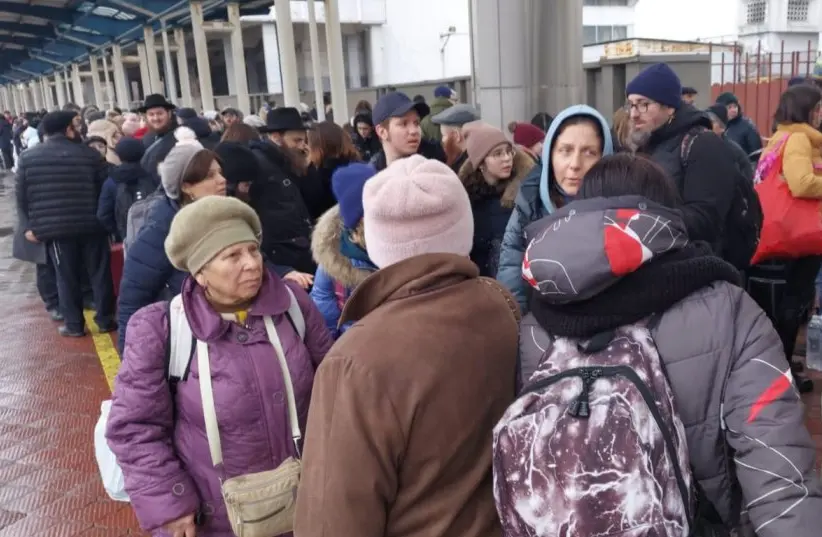
Refugees cannot afford to seek vital medical assistance as a result of being ineligible for healthcare benefits.
Since Russia invaded Ukraine more than two weeks ago, Israel has seen thousands of Ukrainian refugees enter the country to find refuge. Many of these refugees are not Jewish, and thus not eligible for absorption under the Law of Return, which allows anyone with at least one Jewish grandparent to immigrate to Israel.
As a result, these refugees are also ineligible for the many rights granted to Jewish refugees and asylum seekers – including access to universal healthcare.
While Israeli residents are entitled to basic healthcare as a fundamental right, and Jewish immigrants to Israel are afforded this right from the moment they arrive in the country, non-Jewish refugees or asylum seekers are not entitled to the benefit of the National Health Insurance Law.
Instead, asylum seekers in Israel are expected to pay for private health insurance, something which many are unable to afford. In the past, this has mainly been seen with Sudanese and Eritrean asylum seekers, of whom there are about 28,000 presently living in Israel. While they are barred from accessing universal healthcare, asylum seekers who are in full-time employment do receive private health insurance, which their employers are mandated to provide.
However, there are limits to this insurance as it is dependent on continued work and the payments are subtracted from their salaries, rendering it ineffective if the insured person ever becomes unemployed for health reasons.
Regarding Ukrainian refugees, however, the situation is even more complicated. At present, those entering the country are issued a three-month travel visa that gives them the same status as a tourist, thus barring them from finding employment. And without employment, there is no employer to pay for their private health insurance, blocking off yet another passage to accessing healthcare.
Although the government has stated that refugees must pay for both private insurance and, if necessary, hospital visits, many cannot afford this, having arrived in the country with little to no money.
SO WHAT options does a non-Jewish Ukrainian refugee fleeing a war-torn country have when seeking healthcare in Israel?
The first option, and for many, the most ideal option, is to rely on assistance from friends, family and medical charities. On Sunday, March 13, Israel announced that any Ukrainian with a relative living in Israel will be granted entry into the country, separate from the quota of refugees without family.
In this case, then, a refugee with family in Israel may be able to rely on them to fund private health insurance, but of course, there is no guarantee that their relatives will be willing, or able, to cover such large expenses.
Regarding assistance from medical organizations and charities, several have already announced projects to help incoming Ukrainians receive the medical attention that they need.
Last Tuesday, a team from Schneider Children’s Medical Center of Israel set out for the Ukrainian border in a rescue operation, flying children with complex diseases and illnesses to the Jewish state in order to receive treatment under their care, since remaining in Kyiv became increasingly more dangerous. The children, mainly cancer patients, are now receiving the urgent care and treatment that they need at the Schneider Center in Petah Tikva, free of charge.
Additionally, Beersheba’s emergency health clinic, Briuta Medical Center, announced on Monday that it will be covering the costs of all medical services and treatments for Ukrainian refugees in the south of the country. As of now, four children have already been admitted across multiple different hospital departments.
The Briuta Medical Center has stepped in to assist in the complex and challenging situation and will bear all the costs of medical care during the entire stay of the refugees in our area,” said EO Itai Hadad about the decision on Monday morning.
ADDITIONAL RESOURCES available to Ukrainians entering Israel on tourist visas include services developed over the years by either the Health Ministry or Israeli NGOs with the needs of unrecognized asylum seekers in mind.
One such resource that may be available to them is a public health clinic in Tel Aviv, run by Terem Emergency Medical Centers and the Health Ministry. The free clinic provides emergency care, dental care and specialist services in a number of departments to those who do not qualify for coverage under the National Health Insurance Law, excluding tourists.
However, because Ukrainian refugees ineligible for citizenship are entering the country under tourist visas, it is unclear whether or not the free clinic will consider them eligible to receive treatment. The Jerusalem Post reached out to the clinic to inquire about this possibility but received no response.
Another free clinic available for refugees in need of medical assistance is one operated by Physicians for Human Rights Israel (PHRI) in Tel Aviv. They have announced that their Open Clinic “grants medical care to any person lacking legal status and health insurance in Israel,” and invited Ukrainians in need of medical care to visit during their open hours.
WHEN IT comes to Ukrainian refugees being denied access to the healthcare system, many have criticized the decision. Dr. Zoe Gutzeit, director of PHRI, has called on the Health Ministry to clarify its current position on healthcare for Ukrainians, calling it a moral obligation.
“We would like to remind the Israeli government that when taking in refugees, it is obligated to grant them access to healthcare welfare, housing and employment. This is an integral part of the protection to which refugees are entitled,” the PHRI said in a written statement on the subject.
The obligation is not just a moral one, however. In the 1951 Geneva Refugee Convention, which Israel signed onto in 1954, article 23 states that: “The Contracting States shall accord to refugees lawfully staying in their territory the same treatment with respect to public relief and assistance as is accorded to their nationals.”
The document clarifies that participating countries must “grant the relief and assistance accorded to nationals to refugees who are regularly resident in their territory and are unemployed, suffering from physical or mental disease and incapable because of their condition or age of earning a livelihood for themselves.”
Regarding the specific medical help that must be provided to refugees, the Geneva Convention states that it included both hospital treatment and emergency relief.
However, refugees in Israel are exempt from the National Health Insurance Law which mandates that all citizens are entitled to healthcare as a fundamental right, in contrast to the Geneva Convention article which states that refugees must be provided with the same access to items like healthcare as citizens of the country.
According to a report published in Haaretz on March 10, Health Minister Nitzan Horowitz was planning to raise the issue of refugees being required to pay for private health insurance at the Aliyah and Integration cabinet meeting, although no further information has been made available and as of yet, nothing has changed.
When the Post questioned the Health Ministry on this issue, the ministry declined to answer.










